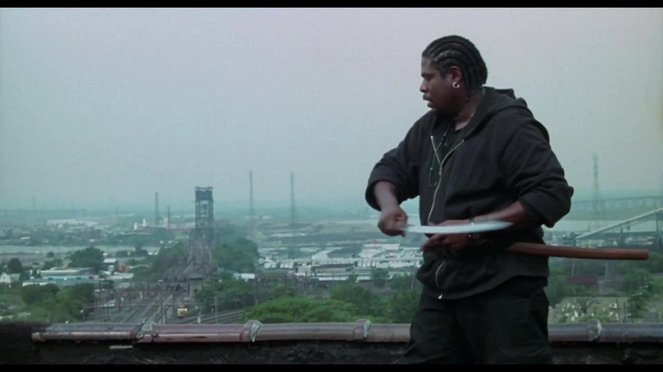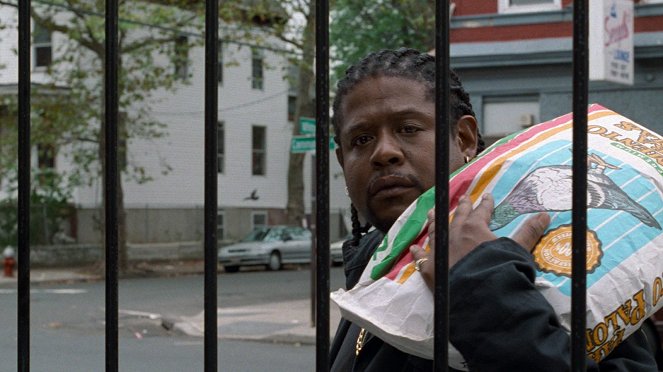Directed by:
Jim JarmuschScreenplay:
Jim JarmuschCinematography:
Robby MüllerComposer:
RZACast:
Forest Whitaker, John Tormey, Cliff Gorman, Dennis Liu, Richard Portnow, Tricia Vessey, Henry Silva, Frank Adonis, Victor Argo, Gano Grills, Chuck Jeffreys (more)VOD (1)
Plots(1)
Killer-for-hire Ghost Dog (Forest Whitaker) lives his life by the ancient Samurai code Hagakure. When his sometime employer Louie (John Tormey) hires him to assassinate gangster Handsome Frank - at the behest of Mafia don Ray Vargo (Henry Silva) - Ghost Dog carries out the job. However, when Vargo discovers that there was a witness to the killing, he orders the reluctant Louie to have Ghost Dog taken out. After Vargo's men ransack his home and slaughter his beloved pigeons, Ghost Dog vows to revenge himself on the crime bosses in true Samurai fashion. (4DVD)
(more)Videos (3)
Reviews (9)
Jarmusch studied poetry and a significant number of his films in some way thematise poets or their works, but Ghost Dog is his most poetic film. The director and screenwriter lets his cinematic poem sail on a flow created by remixing and combining entirely disparate genres and cultural traditions, as well as the present and history. Together with his previous Dead Man, Ghost Dog marked a fundamental transformation in Jarmusch’s work that corresponded with the time of its creation. Out of the post-Cold War enchantment with the ideal of freedom enabling people and cultures to come together, which was typical of his previous work, in both of these films he presents us with a vision of a then nascent and now fully formed world where the most bizarre cultural and historical traditions mix and enrich each other as if in a melting pot. Characteristically for Jarmusch, however, in this brave new world he highlights history and its artefacts and relics, admiring the antique patina that radiates melancholy while also coming across as bizarre or ridiculous in the modern world. As such, he approaches not only genres and traditions, but also characters, or rather people generally, with junk-shop love for all things old and a hipster’s enthusiasm for setting them in a new time and context. Just as he puts gangster flicks, samurai movies and animated slapstick into a mutually reflective and harmonious dialogue, he shows us how the mix of such contradictory influences and inspirations shapes us. Jarmusch’s poeticism and warmth are definitively manifested in the fact that he reveals the paradoxical harmony in opposites and shows us that behind all of the Babylonian chaos of different individualities and tribes, which seems impenetrable at first fleeting glance, there remains a common core of humanity that transcends the boundaries of race and language. Culture, or rather the sharing of stories, characteristically remains the bonding agent. Because those stories resonate with us, they allow us to mature and broaden our horizons, but they also connect us with others, either by enabling us to find a common language or by passing them on. The shared library of characters in Ghost Dog contains the whole spectrum, from canonical classics to rousing pamphlets to superficially likable trash, but mainly also types that few people know but that have played or will play an absolutely essential role in shaping particular people. And that is exactly what Ghost Dog itself has become and it was wonderful to see this timeless gem again after many years (again at Aero) and, in the spirit of the film, to hear how much it was liked after the screening.
()
For me, hands down, the best Jarmusch. If it weren't for his unearthly direction, the film would have been lumped in with dozens of others on a similar theme and in a few years no one would even remember it. But he made an almost cult-classic with a compelling story, a simple yet unique ending, and last but not least, an excellent Whitaker, who doesn't say much, but his acting mastery stands out all the more. Some of the wisecracks are disarming, the storyline with the chatty French ice-cream man is absolutely brilliant, and the strange music by RZA underscores it all beautifully. But the best is the final quote, which aptly characterized the whole film and its thinking. Or not? :) Right between four and five stars.
()
A great example of how Jim Jarmusch is versatile when it comes to genre, and even though it's not a frantic action spectacle bursting with money poured into it, it's all the smarter for it. And of course, there will be action, make no mistake about it. There's a lot of shooting here, and it's quite inventive at times, you'll be surprised. Plus, it's really smart.
()
Ghost Dog is my third encounter with Jim Jarmusch's work, and I still haven't managed to come around to his directorial (and screenwriting) approach. Forest Whitaker was convincing as the unconventional samurai and won my sympathy, despite his "profession". The biggest problem I had was with the overly slow build-up of the plot, which, while corresponding with the "clean and quiet work of the samurai", I found it unrewarding in places. I liked the snippets about the samurai and was intrigued by the ice cream man and his interaction with the main character (EN vs. FR). I believe that if I were a hip hop fan, I would have enjoyed the film more.
()
It’s not as solid as Dead Man, but it’s more approachable for a wider audience. Jarmusch manages to cram a lot of ideas and interesting life insights into what is essentially a simple revenge story of a professional killer who follows the samurai code, thus elevating this film above the ordinary stuff. What I also appreciate is the choice of soundtrack. In Dead Man it was Neil Young's great mimimalism, here it was RZA's hip-hop sounds, which fits the mood of the film perfectly.
()



Ads